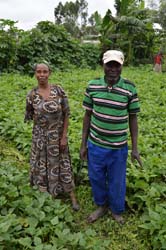Exciting times for N2Africa! We’re gearing up for a major workshop to mark the end of N2Africa Phase I (see the invitation from Jeroen Huising) and to make detailed plans for N2Africa Phase II (as introduced by Charlene McKoin below). The first analysis of our "early impact assessment" is yielding lots of interesting insights and we share some of those with you in this Podcaster, as well as a number of other news items and updates. I’m delighted to share some articles written by our NGO partners from CADS, Zimbabwe and SG2000, Nigeria, as well as a study on the impacts of N2Africa on nutrition security of households in northern Ghana.
As part of our Phase I reflections we are collecting ideas on what makes the contribution of N2Africa? Some first suggestions are:
The Development to Research approach - focusing on immediate dissemination of the "best-bet" technologies and learning loops to ensure continuous improvement.
Proof of concept of the (GL x GR) x E x M equation – demonstrating that an integrated approach is needed to close legume yield gaps and get the important spill-over effects for residual benefits to crops and for livestock feeding.
The massive widespread testing of "best-bet" legume technologies that reveals huge variability in performance in farmers’ fields.
The "learning loop" that has identified soil-specific nutrient deficiencies (of K, Ca, Mg, Zn) that have led to legume-specific fertilizer blends being developed and marketed (e.g. Sympal).
The "learning loop" using farming systems analysis that helps to identify opportunities and constraints of farm (land) size and poverty (lack of livestock and manure) that limit benefits to the poorest - YET - the flexibility of legumes means that there are technologies that can be identified as "best-fits" for every type of farmer. For the poorest households, intercropping and intensification using climbing beans can address hunger and food insecurity, the wealthier farmers can benefit from engaging with grain legume value chains.
The rejuvenation of applied rhizobium research to search for new strains and start to fill the "pipeline" of emerging technologies to enhance nitrogen fixation.
The massive dissemination - reaching more than 250,000 farmers in 4 years - although with less than full uptake due to problems with input supply, purchasing power…
Can you help us identify more highlights? This will be one focus of our meeting in Nairobi.
N2Africa was profiled at the First International Conference on Global Food Security held last month in the Netherlands, which was a great success as reported by the BBC.
|
Through a generous bridging grant we have been able to start up activities in Ethiopia, Tanzania and Uganda already. I had the privilege to visit a number of farmers’ fields together with Dr Endalkachew Wolde-Meskel a week ago. The farmers and local development agents were very excited about the new varieties of common bean: one farmer, Almaz Bombey commented "Common bean is planted and managed by both women and men. This new bean podded as we have never seen before – it is the first time we have used rhizobium and it makes the plants strong!" It was great to see how quickly we can move to demonstrate the benefit of the technologies. Now the challenge is the scaling up and out! I look forward to working with you all to achieve these goals in the coming five years. Photo: Almaz Bombey in her field of common beans with her husband Beyene Gabiso, Shelo-Abore Kebele, Borecha southern Ethiopia |
 |
Ken Giller
